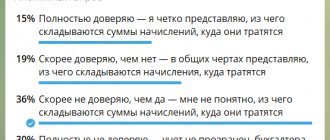Story
The recycling fee was introduced in 2012 simultaneously with Russia’s accession to the WTO and the reduction of import duties on cars.
Initially, only importers paid it. Since 2014, automakers have also started paying (subsidies comparable to the amount of the fee have been introduced for localized automakers, subject to a signed contract with the Ministry of Industry and Trade). Now even buyers pay a recycling fee (if this fee has not yet been paid for their car).
The amount of recycling collection has already increased several times. The base rate for cars is 20,000 rubles, for trucks and buses - 15,000 rubles. When the fee increases, the coefficients by which the base rate is multiplied change, depending on the engine size and age of the vehicle.
Where should I pay the tax when importing a car from abroad?
If the payment is made when importing a car from another state, the funds are collected by the Federal Customs Service. Payments must be made within the customs clearance period. You will also need to pay a recycling fee. In order to do all this, you need to come to the customs office at your place of residence. You need to take the following documents with you:
- Recycling fee calculation form (must be completely completed).
- PTS for the car for which payments are made.
- Copies of papers that confirm the compliance of the machine’s characteristics with the data specified in the calculation (for example, a certificate of conformity, relevant expert opinions, accompanying documents).
- Vehicle purchase and sale agreement.
- Payment documents confirming payments.
- If a trusted person is involved in the procedure, a power of attorney will be required for him. After providing all these documents, specialists check the accuracy of the calculations performed, the authenticity of the papers, and payments to the FC account. After this, a mark is placed in the PTS about the payment of the recycling fee.
IMPORTANT! Bank details for transferring funds are posted on the FCS website.
Nuances
There are several situations when you do not need to pay recycling fees:
- the car was brought into Russia as personal property by forced migrants or participants in the voluntary resettlement of compatriots from abroad;
- the car belongs to consulates, diplomatic missions, international organizations, employees of such organizations or members of their families;
- 30 or more years have passed since the car was manufactured;
- Less than three years have passed since the car was released.
What should I do if the fee is paid in a larger amount?
In this case, a request for a refund will be left. It is sent to the authority where the tax was paid. In addition to the document, you must provide the following documents:
- Payment documents evidencing payment of the fee.
- Confirmation that the fee was paid in excess (for example, the difference between the calculation carried out and the amount indicated in the payment order).
- The application is reviewed within a month. After this, a decision is made. If the authorized body refuses to return, the refusal must be justified.
ATTENTION! You can apply for a refund of the overpaid amount within three years from the date of payment. However, this is best done faster, since the funds are not indexed. That is, after three years they will be issued in the same amount as they were paid. It is very likely that inflation will “eat up” a large amount of money.
Most legal entities and individuals do not face the need to pay the tax. However, if it does occur, you need to figure out the order in which funds are transferred. There are many nuances. In some circumstances, funds are transferred to one authorized body, in others - to another. After making payments, you must save the payment document. He will confirm the fact and amount of payment, if required.
Criticism
In 2021, the Accounts Chamber criticized the recycling fee. According to the department, it does not fulfill the function for which it was introduced, and is not able to ensure environmental safety, protection of human health and the environment from the harmful effects of transport.
“The priority for the state of the fiscal and regulatory functions of the recycling fee is obvious over ensuring environmental safety as the purpose of the fee formulated when it was established,” the auditors indicated.
What does the information about the fee in the PTS say?
The recycling fee (US) is a special type of excise tax, the need for which is reflected in the Law “On Production and Consumption Waste” No. 89 (clause 1, article 24-1).
It is presented in the form of a one-time payment aimed at guaranteed recycling of the car after destruction.
This means that the state thereby takes care of the environment, obliging the manufacturer or buyer to pay in advance for future work on recycling the vehicle.
ATTENTION! In the vehicle passport, in the “Special notes” field, there must be an entry indicating payment of this fee.
However, the lack of this information may not always be a cause for concern. There may be several reasons for non-payment of the fee:
- The passport for a Russian or imported car was issued before September 1, 2012. There is no need to pay this payment when purchasing and owning such a vehicle.
- The car is imported into the Russian Federation from abroad by the buyer. He is also responsible for paying the fee.
There is another reason that does not occur so often. The previous owner was somehow able to bypass the need to pay the fee. In turn, this responsibility falls on the buyer, since information about the existence of a collection debt will be checked during registration.
You may also encounter a situation where a new vehicle title is issued to replace the scrapped one. This is done when there are already a lot of entries in the old passport and new ones simply do not fit.
ABOUT
In PTS issued from September 1, 2012 to December 31, 2013, you can find information with the corresponding register number that does not need to be decrypted. This entry states that the manufacturer assumes responsibility for processing this vehicle, and accordingly, the buyer no longer has to make this payment separately.
In this situation, it is necessary to check whether the manufacturer is included in the register of companies involved in recycling. If the company that accepted responsibility is no longer on this list, the car owner should keep in mind that problems will arise when registering the vehicle with the traffic police.
You can see what the PTS mark looks like in the photo:
Results
As we see, since the introduction of the vehicle recycling fee, this situation has worried buyers no less than at the time of its adoption. As a rule, questions begin to arise when purchasing used vehicles or when importing them on your own.
Due to the need to pay this excise tax, units of vehicles greatly increased in price, which could not affect the purchasing power of the population. One way or another, this fee is mandatory to pay, and postponing the resolution of this issue only increases the size of the final amount.
Who makes the mark
In documents importing vehicles and self-propelled machines into Russia, a note indicating payment or exemption of the citizen from payment is placed by an authorized customs officer. The mark is certified by the official’s personal seal and placed in the “Special Marks” section.
What the entry might look like:
- “The disposal fee has been paid. TPO “___” (indicate the number of the customs receipt order reflecting the calculation).
- “The recycling fee is not paid” (indicated on the basis of which paragraph of Article 24.1 of Federal Law No. 89 is not paid).
The vehicle manufacturer on the territory of the Russian Federation pays the duty and submits the necessary documents confirming the fact of payment, together with the passport of the technical equipment or self-propelled vehicles, to the tax service at the location of the manufacturer. In this case, the mark is affixed by the tax office.
Large manufacturers in Russia that produce wheeled vehicles, self-propelled vehicles and trailers for them can independently put a mark if they are included in the register.
Individuals and organizations that have not paid submit documents (PTS or PSM) to the tax office at their location or residence.
When the PTS is lost, stolen or becomes unusable, a duplicate document is issued. In this case, the duplicate is marked by traffic police officers. If it is a self-propelled vehicle - the State Technical Supervision Authority.
Is it possible to return it back in case of an error?
We can talk about restoring the recycling fee only in cases where this payment was made due to an error, for example, in the case of a repeated payment. Of course, such situations are rare, but they should be talked about.
To receive funds, you must submit an application to the relevant authorities that received the fee, namely:
- Customs service - in cases of imported vehicles.
- Tax office - for Russian cars.
IMPORTANT! A citizen of the Russian Federation is given 3 years to apply for an erroneously paid tax payment.
The owner of the car must have a passport of a citizen of the Russian Federation, a title for the vehicle, a document with proof of payment for the fee by the previous owner and a receipt. It would be a good idea to prepare copies of these documents in advance. You can receive and fill out a refund form on site. You should expect a response to your application within a month.
How to prove the fact of exemption from payment
A person exempt from paying the recycling fee must prove this fact. To do this, the citizen must document that he is a refugee, a participant in the return program, an embassy employee, etc. If we are talking about a migrant, then only the citizen himself receives such a benefit (this opportunity does not apply to members of his family).
If the owner of the vehicle was exempt from paying the fee, but then sold the car, the new owner will have to pay the fee in full. The benefits do not apply to the vehicle, but to its owner.
Return of recycling fee
Incorrectly (excessively) paid TC can be returned or taken into account as advance payments on the basis of clause 25 of the Government of the Russian Federation No. 1291.
To return funds to the customs authorities, an application must be submitted, the form of which is approved in Appendix No. 4 to the said resolution.
In common cases of import of cars by private individuals, the recycling fee is an insignificant amount in the total cost of the car: 3,400 - 5,200 rubles. In cases of special equipment, this same parameter can reach a seven-digit figure and exceed the original price of the vehicle.
The problem may also lie in the erroneous accrual of the DC, which must be returned. You can do this yourself, but in particularly difficult cases it is better to contact a car lawyer. Your first online consultation is free. To do this, just describe the problem using the form below and wait for a response from the lawyer.
Full list of basic recycling fee rates for 2021 in rubles
| Types and categories of vehicles | Amount of recycling fee in Russian rubles | |
| Up to 3 years from the date of issue | Older than 3 years from the date of issue | |
Recycling fee for a passenger car (category B, including for an electric car): | ||
| with electric motors, with the exception of vehicles with a hybrid powertrain | 32600 | 122000 |
with engine displacement: | ||
| no more than 1000 cubic meters centimeters | 48200 | 123000 |
| over 1000 cubic meters centimeters, but not more than 2000 cubic meters. centimeters | 178400 | 313800 |
| over 2000 cubic meters centimeters, but not more than 3000 cubic meters. centimeters | 281600 | 480200 |
| over 3000 cubic meters centimeters, but not more than 3500 cubic meters. centimeters | 259600 | 570000 |
| over 3500 cubic meters centimeters | 445000 | 700200 |
| imported by individuals for personal use, regardless of engine size | 3400 | 5200 |
Recycling fee for a truck (categories B, C, including truck tractor, refrigerator, van, dump truck) | ||
| with a total weight of no more than 2.5 tons | 178500 | 189000 |
| with a total weight of over 2.5 tons, but not more than 3.5 tons | 300000 | 432000 |
| total weight over 3.5 tons, but not more than 5 tons | 300000 | 456000 |
| with a total weight of over 5 tons, but not more than 8 tons | 313500 | 786000 |
| with a total weight of over 8 tons, but not more than 12 tons | 438000 | 1192500 |
| with a total weight of over 12 tons, but not more than 20 tons | 496500 | 1735500 |
| Truck tractors with a gross weight of over 12 tons, but not more than 20 tons | 850500 | 3469500 |
| Dump trucks with a gross weight of over 12 tons, but not more than 20 tons | 418500 | 1735500 |
| Vans, including refrigerators, with a gross weight exceeding 12 tons, but not more than 20 tons | 507000 | 1735500 |
| Vehicles with a gross weight of over 20 tons, but not more than 50 tons | 1002000 | 2035500 |
| Truck tractors with a gross weight of over 20 tons, but not more than 50 tons | 1002000 | 2035500 |
| Dump trucks with a gross weight of over 20 tons, but not more than 50 tons | 945000 | 2035500 |
| Vans, including refrigerators, with a gross weight exceeding 20 tons, but not more than 50 tons | 825500 | 2035500 |
Recycling fee for special vehicles (on the chassis of a category “C” truck) | ||
| special vehicles other than concrete mixer trucks (chassis-based concrete mixers) | 285000 | 1725000 |
| concrete mixer trucks (chassis-based concrete mixers) | 853500 | 2242500 |
Recycling fee for buses (category D) | ||
| with an engine capacity of no more than 2500 cc. centimeters | 214500 | 217500 |
| with electric motors, with the exception of vehicles with a hybrid powertrain | 171000 | 172500 |
| with engine capacity over 2500 cc. centimeters, but not more than 5000 cubic meters. centimeters | 342000 | 517500 |
| with engine capacity over 5000 cc. centimeters, but not more than 10,000 cubic meters. centimeters | 591000 | 759000 |
| with engine capacity over 10,000 cc. centimeters | 990000 | 1558500 |
Recycling fee for dump trucks intended for use in off-road conditions (quarry dump trucks) | ||
| with a gross weight of over 50 tons, but not more than 80 tons | 3360000 | 7668000 |
| with a gross weight of over 80 tons, but not more than 350 tons | 6195000 | 7920000 |
| total weight over 350 tons | 9165000 | 9900000 |
Recycling fee on wheeled vehicle chassis | ||
| chassis of trucks with a gross weight of not more than 3.5 tons | 300000 | 468000 |
| chassis of trucks with a gross weight of over 3.5 tons, but not more than 5 tons | 300000 | 456000 |
| chassis of trucks with a gross weight of over 5 tons, but not more than 8 tons | 313500 | 786000 |
| chassis of trucks with a gross weight of over 8 tons, but not more than 12 tons | 438000 | 1192500 |
| chassis of trucks with a gross weight of over 12 tons, but not more than 20 tons | 496500 | 1735500 |
| chassis of trucks with a gross weight of over 20 tons, but not more than 50 tons | 1002000 | 2035500 |
| bus chassis with a gross weight of not more than 5 tons | 456000 | 759000 |
| chassis of buses with a gross weight of over 5 tons | 570000 | 897000 |
Disposal fee for graders and levelers | ||
| power plant power less than 100 hp | 552000 | 1466250 |
| power plant power of at least 100 hp and less than 140 hp | 724500 | 1897500 |
| power plant power of at least 140 hp and less than 200 hp | 1035000 | 2794500 |
| power plant power of at least 200 hp | 1380000 | 4088250 |
Recycling fee for bulldozers | ||
| power plant power less than 100 hp | 690000 | 2070000 |
| power plant power less than 100 hp and less than 200 hp | 1207500 | 6037500 |
| power plant power less than 200 hp and less than 300 hp | 1449000 | 9487500 |
| power plant power less than 300 hp and less than 400 hp | 1725000 | 12075000 |
| power plant power of at least 400 hp | 2587500 | 17250000 |
Recycling fee for excavators, backhoe loaders, backhoe bulldozers | ||
| power plant power less than 170 hp | 690000 | 2932500 |
| power plant power less than 170 hp and no less than 250 hp | 1035000 | 4312500 |
| power plant power of at least 250 hp | 1380000 | 6986250 |
Recycling fee for wheeled material handlers | ||
| power plant power less than 100 hp. | 431250 | 13213500 |
| power plant power of at least 100 hp. and no more than 125 hp. | 569250 | 21614250 |
| power plant power of at least 125 hp. and no more than 150 hp. | 690000 | 21614250 |
| power plant power more than 150 hp | 759000 | 27755250 |
Recycling fee for tamping machines and road rollers | ||
| power plant power less than 40 hp | 120750 | 552000 |
| power plant power of at least 40 hp and less than 80 hp | 293250 | 1259250 |
| power plant power of at least 80 hp | 379500 | 1673250 |
Recycling fee for front and fork loaders | ||
| power plant power of at least 5.5 hp. and less than 50 hp | 172500 | 1035000 |
| power plant power of at least 50 hp and less than 100 hp | 345000 | 1725000 |
| power plant power of at least 100 hp and less than 200 hp | 690000 | 2932500 |
| power plant power of at least 200 hp and less than 250 hp | 776250 | 3450000 |
| power plant power of at least 250 hp and less than 300 hp | 862500 | 5175000 |
| power plant power of at least 300 hp and less than 400 hp | 1207500 | 6037500 |
| power plant power of at least 400 hp | 2501250 | 12075000 |
Recycling fee for self-propelled cranes, with the exception of cranes based on the chassis of wheeled vehicles | ||
| power plant power less than 170 hp | 1983750 | 7641750 |
| power plant power of at least 170 hp and less than 250 hp | 3915750 | 16473750 |
| power plant power of at least 250 hp | 5226750 | 41072250 |
Recycling fee for pipe-laying cranes | ||
| power plant power less than 130 hp | 1725000 | 5175000 |
| power plant power of at least 130 hp and less than 200 hp | 2760000 | 8625000 |
| power plant power of at least 200 hp and less than 300 hp | 3622500 | 12075000 |
| power plant power of at least 300 hp | 4312500 | 17250000 |
Recycling fee for trailers not for public roads | ||
| trailers with a carrying capacity of more than 10 tons | 172500 | 1207500 |
| semi-trailers with a carrying capacity of more than 10 tons | 172500 | 1207500 |
Recycling fee for trailers and semi-trailers | ||
| Full trailers | 96000 | 1207500 |
| Semi-trailers | 96000 | 1207500 |
| Center axle trailers | 96000 | 1207500 |
Recycling fee for road maintenance vehicles (other self-propelled road and municipal vehicles), with the exception of road maintenance vehicles built on the chassis of wheeled vehicles | ||
| power plant power less than 100 hp. | 483000 | 1880250 |
| power plant power of at least 100 hp. and less than 220 hp | 707250 | 2846250 |
| power plant capacity of more than 220 hp. | 810750 | 3329250 |
Recycling fee for forestry machines | ||
| power plant power of at least 20 hp. and less than 100 hp | 1380000 | 8625000 |
| power plant power of at least 100 hp. and less than 300 hp | 2501250 | 10350000 |
| power plant capacity of more than 300 hp. | 3105000 | 12075000 |
Recycling fee for forwarder vehicles | ||
| power plant power of at least 20 hp. and less than 100 hp | 1380000 | 8625000 |
| power plant power of at least 100 hp. and less than 300 hp | 2501250 | 10350000 |
| power plant capacity of more than 300 hp. | 3105000 | 12075000 |
Recycling fee for front-end timber loaders and skidders (skidders) for forestry | ||
| power plant power of at least 20 hp. and less than 100 hp | 1380000 | 1725000 |
| power plant power of at least 100 hp. and less than 300 hp | 2501250 | 7762500 |
| power plant capacity of more than 300 hp. | 3105000 | 10350000 |
Recycling fee for all-terrain vehicles, ATVs, snow and swamp-going vehicles | ||
| with an engine capacity of less than 300 cc. centimeters | 69000 | 120750 |
| with an engine capacity of at least 300 cc. centimeters | 120750 | 224250 |
Recycling fee for snowmobiles | ||
| With an engine capacity of less than 300 cc. centimeters | 69000 | 120750 |
| with an engine capacity of at least 300 cc. centimeters | 120750 | 224250 |
Recycling fee for agricultural wheeled tractors | ||
| The power of the power plant is more than 5.5 hp. and no more than 30 hp. | 69000 | 310500 |
| The power of the power plant is more than 30 hp. and no more than 60 hp. | 86250 | 379500 |
| The power of the power plant is more than 60 hp. and no more than 90 hp. | 120750 | 517500 |
| The power of the power plant is more than 90 hp. and no more than 130 hp. | 258750 | 1207500 |
| The power of the power plant is more than 130 hp. and no more than 180 hp. | 431250 | 1725000 |
| The power of the power plant is more than 180 hp. and no more than 220 hp. | 517500 | 2587500 |
| The power of the power plant is more than 220 hp. and no more than 280 hp. | 655500 | 3450000 |
| The power of the power plant is more than 280 hp. and no more than 340 hp. | 862500 | 3795000 |
| The power of the power plant is more than 340 hp. and no more than 380 hp. | 1155750 | 4312500 |
| The power of the power plant is more than 380 hp. | 1552500 | 6900000 |
Recycling fee for agricultural crawler tractors | ||
| The power of the power plant is no more than 100 hp. | 258750 | 1207500 |
| The power of the power plant is more than 100 hp. and no more than 200 hp. | 431250 | 1725000 |
| The power of the power plant is more than 200 hp. | 1552500 | 4830000 |
Recycling fee for grain harvesters | ||
| The power of the power plant is more than 25 hp and not more than 160 hp. | 414000 | 1518000 |
| The power of the power plant is more than 160 hp. and no more than 220 hp. | 621000 | 2277000 |
| The power of the power plant is more than 220 hp. and no more than 255 hp. | 948750 | 3036000 |
| The power of the power plant is more than 255 hp. and no more than 325 hp. | 1121250 | 3795000 |
| The power of the power plant is more than 325 hp. and no more than 400 hp. | 1466250 | 5161200 |
| The power of the power plant is more than 400 hp. | 2070000 | 7841850 |
Recycling fee for self-propelled forage harvesters | ||
| The power of the power plant is no more than 295 hp. | 862500 | 2201100 |
| The power of the power plant is more than 295 hp. and no more than 401 hp. | 1587000 | 4554000 |
| The power of the power plant is more than 401 hp. | 2484000 | 9108000 |
Recycling fee for self-propelled agricultural machines | ||
| Self-propelled plant protection sprayers with a power plant power of more than 100 hp and no more than 120 hp. | 345000 | 1725000 |
| Self-propelled plant protection sprayers with a power plant power of more than 120 hp. and no more than 300 hp. | 1380000 | 5175000 |
| Self-propelled plant protection sprayers with a power plant power of more than 300 hp. | 2760000 | 6900000 |
| Self-propelled mowers | 690000 | 2528850 |
Dump trucks designed for off-road use | ||
| power plant power less than 650 hp | 3864000 | 8818200 |
| power plant power of at least 650 hp. and less than 1750 hp | 7124250 | 9108000 |
| power plant power of at least 1750 hp. | 10539750 | 11385000 |
How does it affect prices?
As has already become clear, the recycling fee even for passenger cars can amount to hundreds of thousands of rubles. Ratios have increased since the beginning of 2020
(in the examples we took into account the current values), and they increased significantly - some by 46% (for cars with engines up to 1 liter), and some by
145%
(more than 3.5 liters).
Experts immediately assessed the impact of the rate increase on the increase in car prices - in their opinion, prices will increase by 2-4%, but they will only know for sure based on the results of the first months of 2021.
The recycling fee was increased in order to compensate for the next reduction in import duties - at the request of the WTO, they were reduced from 17 to 15%, and the increase in the recycling fee will ultimately keep the protective tariff at 30%.
But for those who produce cars within the country, at first glance, there is no need to worry: for them, the Ministry of Industry and Trade supports the mechanism of industrial subsidies - for the fact that cars are produced within Russia, manufacturers are compensated for the cost of paying a recycling fee.
All this exists within the system of special investment contracts (SPIC), and from 2021, subsidies will be higher for those who have achieved a high level of localization of production.
In other words, Russian car manufacturers using “screwdriver assembly” technology
soon - from 2022 - they will be treated like importers and forced to pay the full recycling fee (for now, they will be compensated for 50% of the fee).
That is, those who were able to arrange full-cycle production - including stamping, welding and painting of bodies -
(without this, the manufacturer will not achieve the minimum localization points and will not receive a subsidy).
However, experts still consider the recycling fee to be an attempt by the state to earn more money. Natalya Belyaeva reminds us that money is still not being spent on equipment recycling infrastructure:
Thus, the adaptation of Russian legislation to the conditions of WTO membership gave rise to the greatest fraud.
Every year the budget receives approximately 180 billion rubles, of which NOT a single ruble is spent on what was promised and included in Law 89-FZ “On Production and Consumption Waste” (clause 8 of Article 24.1) - “compensation from the budget for costs of creation of the infrastructure that will be required for the recycling of equipment.”
Now everyone shyly avoids the topic of such compensation. At the same time raising the recycling fee rates.
Natalya Belyaeva, General Director of Delphi LLC, representative of the expert council under the Government of the Russian Federation.
On the other hand, maintaining customs barriers made it possible to support domestic producers. , more than 90% of cars sold domestically are produced in Russia.
, which allowed the industry to survive the crisis relatively calmly.
As for commercial vehicles, the recycling fee makes adjustments to business plans, says Dmitry Melnikov. According to him, the extension of the tax to semi-trailers ruined the business of those who made money from their import:
Judging by the truck market, the introduction of a recycling fee has achieved a lot. Eight years ago, there were very few new KAMAZ trucks, especially in long-haul transportation. The main mainline tractor at that time on our roads was a 5-10 year old European tractor. Now the share of the same KAMAZ is already significant, and not only large federal companies, but also small businesses have switched to this equipment.
Of course, there is nothing good for the market in creating artificial competition; this is not a healthy path of development. However, whatever one may say, it worked, and the domestic manufacturer strengthened its position. And maybe that's a good thing. Perhaps the development of the domestic automobile industry is a more important task than supporting small enterprises. I cannot judge this from my private position.
However, in 2021, the recycling fee made itself felt again. It was once again increased, and fees were introduced for the first time for some types of equipment, and some. This year, for me personally, as an importer of equipment, the semi-trailer market was closed. A restrictive tax rate was introduced for semi-trailers older than three years.
Unlike 2012, when the reasons were clear and the “heirs” of this market were clear, in the form of domestic manufacturers of, say, truck tractors. Which were able to provide the market with equipment in the required volumes. In 2018, the situation became completely unclear.
Yes, there are manufacturers of semi-trailers in Russia. But, unlike manufacturers of tractors and trucks, these manufacturers at the time of the introduction of fees were not able to satisfy the demand, not in terms of production capacity, not in terms of the quality of their products.
What happened in the end? I will only comment on the semi-trailer market, since it will be as clear as possible. Sales of domestic semi-trailers have not increased. Yes, they have grown, but not significantly. They still didn’t buy them!
Who then replaced the market for used semi-trailers from Europe? Yes, essentially, no one. The only thing is that new players have appeared on the market and sales of some imported brands have increased. Due to what? By reducing the price of products.
Why did they reduce prices? Naturally, at the expense of quality.
Dmitry Melnikov, director of SibAutoConsult.
As a result, the expert believes, instead of a working program for replacing and recycling obsolete old equipment, we have the problem of operating old (and often worn out) equipment
on the roads. Some carriers left the market because they were unable to buy new equipment even at Russian prices; the rest have to save money and put on the road semi-trailers older than 7-10 years.
At the same time, there is still imported equipment, but its quality is noticeably inferior to its “big brothers”, it is less safe and environmentally friendly, and still does not benefit the domestic manufacturer, says Melnikov:
Before the introduction of the barrier tax on semi-trailers, as a rule, it was impractical to operate a 15-20 year old semi-trailer. They were actually sold for scrap metal, since it was more profitable to buy a 5-7 year old semi-trailer than to operate an older one.
Now there is no such possibility. Moreover, another, actually illegal business has already begun to develop - the sale of old frames with documents from European semi-trailers, with the aim of restoring this equipment in a makeshift way.
All this, of course, is in no way similar to the struggle for safety and the environment.
What can we expect from the 2021 raises? Time will tell. In general, ecology, safety and support for domestic producers are right and good. But the methods by which this is done leave much to be desired.
Dmitry Melnikov, director of SibAutoConsult.
Therefore, it is difficult to somehow unambiguously assess the recycling fee: on the one hand
, its introduction loaded Russian automobile factories with work, but
on the other hand
, it reduced the choice, and in the field of commercial vehicles it was especially ruinous.
Payment order
Having figured out what the recycling fee mark on the vehicle vehicle means, who pays it and why, you should also know the payment procedure. The payment rules in paragraph 6 determine that payment is made in Russian rubles personally by the owner, by sending funds to the appropriate budget classification code with a separate payment order. The money goes to the Federal Treasury account.
You can find information about tax invoices on the Internet on the official website of the Federal Customs Service or the Federal Tax Service.
It is important to pay attention to ensure that the following fields are filled in:
- (104) – budget classification code (KBK), in accordance with the Russian budget classification system.
- (107) – code of the body administering incoming payments, consisting of 8 characters.
It is impossible to count this type of state duty into other payments.
According to clause 8 of the Payment Rules, the payer is obliged to provide a package of documents to the customs authority where the transport is declared or to the authority at the place of residence, to confirm the correct calculation of the tax:
- Calculation of the amount of duty in the prescribed form (Appendix 1 to the rules), which is filled out and signed personally by the payer.
- Copies of examinations.
- A copy of the certificate that the structure is safe.
- Copies of documents accompanying the goods (if available).
- A copy of the vehicle type approval document.
- Payment document confirming payment.
Always retain copies of submitted documents, statements, checks and payment orders for three years.







